Cardiac ekg rhythms - Study guides, Class notes & Summaries
Looking for the best study guides, study notes and summaries about Cardiac ekg rhythms? On this page you'll find 639 study documents about Cardiac ekg rhythms.
Page 4 out of 639 results
Sort by
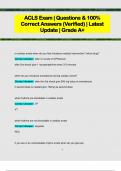
-
ACLS Exam | Questions & 100% Correct Answers (Verified) | Latest Update | Grade A+
- Exam (elaborations) • 12 pages • 2024
- Available in package deal
-
- $11.49
- + learn more
in cardiac arrest when do you first introduce medical intervention? which drug? Correct Answer: after 2 rounds of CPR/shock after 2nd shock give 1 mg epinephrine every 3-5 minutes when do you introduce amiodarone during cardiac arrest? Correct Answer: after the 3rd shock give 300 mg bolus of amiodarone if second dose is needed give 150mg as second dose what rhythms are shockable in cardiac arrest Correct Answer: VF VT what rhythms are not shockable in cardiac arrest Correct Answer: asy...
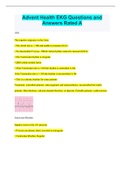
-
Advent Health EKG Questions and Answers Rated A
- Exam (elaborations) • 20 pages • 2023
-
Available in package deal
-
- $9.49
- 1x sold
- + learn more
Advent Health EKG Questions and Answers Rated A Afib The impulse originates in the Atria • The Atrial rate is > 300 and unable to measure [N/A] • No discernable P waves - PRI & Atrial rhythm cannot be measured [N/A] • The Ventricular rhythm is irregular • QRS within normal limits • If the Ventricular rate is <100 the rhythm is controlled A-fib; if the Ventricular rate is > 100 the rhythm is uncontrolled A-fib • This is a chronic rhythm for some patients Treatment: controlle...
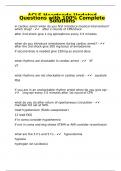
-
ACLS Heartcode Updated Questions with 100% Complete Solutions
- Exam (elaborations) • 23 pages • 2024
-
Available in package deal
-
- $12.99
- + learn more
in cardiac arrest when do you first introduce medical intervention? which drug? - after 2 rounds of CPR/shock after 2nd shock give 1 mg epinephrine every 3-5 minutes when do you introduce amiodarone during cardiac arrest? - after the 3rd shock give 300 mg bolus of amiodarone if second dose is needed give 150mg as second dose what rhythms are shockable in cardiac arrest - VF VT what rhythms are not shockable in cardiac arrest - asystole PEA if you are in an unshockable...
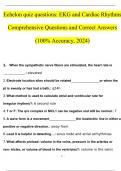
-
Echelon quiz questions: EKG and Cardiac Rhythms Comprehensive Question and Answer Session with a Perfect 100% Accuracy, 2024
- Exam (elaborations) • 7 pages • 2024
-
- $7.49
- + learn more
Echelon quiz questions: EKG and Cardiac Rhythms Comprehensive Question and Answer Session with a Perfect 100% Accuracy, 2024
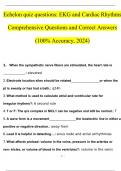
-
Echelon quiz questions: EKG and Cardiac Rhythms Comprehensive Question and Answer Session with a Perfect 100% Accuracy, 2024
- Exam (elaborations) • 7 pages • 2024
-
- $7.49
- + learn more
Echelon quiz questions: EKG and Cardiac Rhythms Comprehensive Question and Answer Session with a Perfect 100% Accuracy, 2024
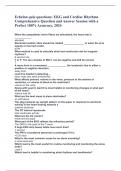
-
Echelon quiz questions: EKG and Cardiac Rhythms Comprehensive Question and Answer Session with a Perfect 100% Accuracy, 2024
- Exam (elaborations) • 3 pages • 2024
-
- $9.49
- + learn more
Echelon quiz questions: EKG and Cardiac Rhythms Comprehensive Question and Answer Session with a Perfect 100% Accuracy, 2024 When the sympathetic nerve fibers are stimulated, the heart rate is ____________. elevated Electrode location sites should be rotated _______________ or when the pt is sweaty or has had a bath. q24h What method is used to calculate atrial and ventricular rate for irregular rhythms? 6 second rule T or F: The qrs complex in MCL1 can be negative and still be normal...
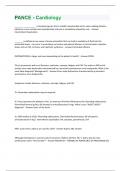
-
PANCE - Cardiology Questions And Answers Latest Study Solutions
- Exam (elaborations) • 91 pages • 2024
- Available in package deal
-
- $7.99
- + learn more
________ __________ = cramping leg pain that is reliably reproducable by the same walking distance (distance is very constant and reproducible) and pain is completely relieved by rest. - AnswerIntermittent Claudication ________is defined as any cause of acute pericarditis that can lead to exudation of fluid into the pericardial space - can occur in associateon w/ ascites and pleural effusion in salt and water retention states such as CHF, cirrhosis, and nephrotic syndrome. - Answer-Pericardi...
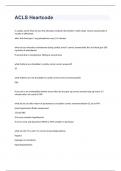
-
ACLS Heartcode exam 2023 with 100% correct answers
- Exam (elaborations) • 20 pages • 2023
-
Available in package deal
-
- $16.49
- + learn more
in cardiac arrest when do you first introduce medical intervention? which drug? correct answersafter 2 rounds of CPR/shock after 2nd shock give 1 mg epinephrine every 3-5 minutes when do you introduce amiodarone during cardiac arrest? correct answersafter the 3rd shock give 300 mg bolus of amiodarone if second dose is needed give 150mg as second dose what rhythms are shockable in cardiac arrest correct answersVF VT what rhythms are not shockable in cardiac arrest correct answersasyst...
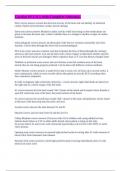
-
Cardiac PCCN || with Complete Solutions.
- Exam (elaborations) • 11 pages • 2024
-
Available in package deal
-
- $11.49
- + learn more
EKG correct answers records the electrical activity of the heart and can identify an abnormal cardiac rhythm and sometimes cardiac muscle damage Stress test correct answers Monitors cardiac activity while exercising or after medications are given to increase the heart rate. it detect whether there is a change in rhythm or signs of cardiac ischemia echocardiogram correct answers an ultrasound of the heart to evaluate contractility and valve function. Can be done through the chest wall or tr...
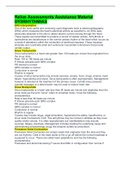
-
Relias Assessments Assistance Material DYSRHYTHMIAS (Answered) 2022/2023
- Exam (elaborations) • 5 pages • 2022
-
Available in package deal
-
- $9.49
- 2x sold
- + learn more
Relias Assessments Assistance Material DYSRHYTHMIAS EKG interpretation One of the most useful and commonly used diagnostic tools is electrocardiography (EKG) which measures the heart's electrical activity as waveforms. An EKG uses electrodes attached to the skin to detect electric current moving through the heart. These signals are transmitted to produce a record of cardiac activity. Arrhythmia or dysrhythmia are disturbances in the normal cardiac rhythm of the heart which occurs as a result ...

How did he do that? By selling his study resources on Stuvia. Try it yourself! Discover all about earning on Stuvia


